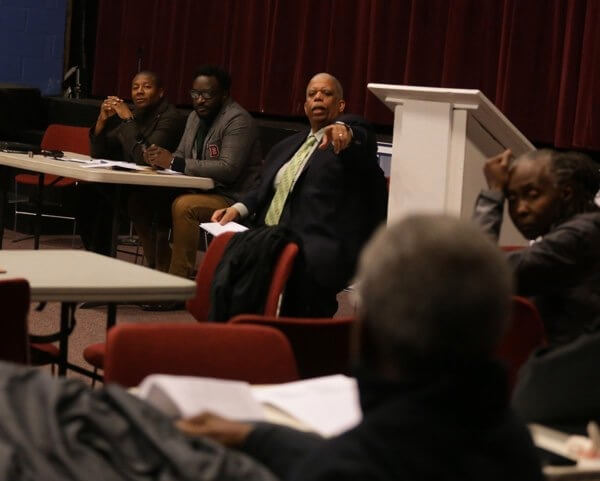By Mark Hallum
The black community in Jamaica engaged in a meeting Saturday with elected officials and activists to discuss their feelings after the presidential election, which dismayed many who expressed not only apprehension toward the prospect of a Donald Trump administration, but also disillusionment toward the Democratic Party.
State Sen. James Sanders (D-South Ozone Park) hosted the meeting at the Black Spectrum Theatre at 177 Baisley Blvd. with fellow state Sen. Leroy Comrie (D-St. Albans), Rev. Johnnie Green and Oster Bryan, vice president of CommUnity 1st, as panelists. They addressed the concerns raised by the Trump victory and the next step toward protecting the black community against possible disadvantages they might face.
Many agreed that whatever ensues the responsibility is in the hands of the community and their elected officials to organize and look out for the best interests of the black community as opposed to depending on the system at large for support and representation.
“I think a vote for Trump is a fundamental misunderstanding of who Trump is and what he represents,” Sanders said. “Trump is such a danger to America as a whole and to black people, in particular. If you were going to cast a protest vote, you could have gone with Jill Stein or Gary Johnson, but when you are voting for a person who says he has a noose for you, then you’re voting for the noose.”
Bryan explained that when he went to the polls Nov. 8, he had watched as reader machines malfunctioned and expressed doubts as to whether neighborhoods of Little Neck and Douglaston experienced the same issues, which he viewed as direct negligence of black communities. At the critical moment, he decided he would cast a protest vote for Trump.
“We’ve been voting Democrat for over 50 years, but our voting machines don’t work on Election Day. The definition of insanity is doing the same thing over and over again and expecting different results,” said Bryan. “I just had a moment of clarity as I was filling out that sheet, and I decided, let me make a protest at this point, and so I voted for Trump.”
Bryan was not alone in the meeting to admit to having voted for the Republican nominee, and several others at the meeting of about 80 spoke up about casting a ballot for Trump because of disillusionment with the Democratic Party.
According to Bryan, racism is more than antagonizing behavior, it is a system of oppression, which he sees defined more by the Democratic Party’s neglect of minorities rather than the rhetoric adopted by Trump during his campaign.
Green thought the success of Trump was largely the result of dysfunction within the Democratic Party, which was put on display during the primary election when Clinton was nominated over U.S. Sen. Bernie Sanders.
“There was a lot of backlash from the black community,” Green said. “She did not get the black support she hoped to get. How could she even desire the black support when this is the same woman who called us superpredators? “
“This is the same woman who supported the laws that her husband had passed that incarcerated an unprecedented number of African-American men and women, and many of them are still incarcerated today. So I’m sorry, we have to live with Donald Trump for at least the next four years because the chickens have come home to roost in our own backyard.”
In 1996, Clinton spoke in support of Bill Clinton’s Violent Crime Control and Law Enforcement bill that took aimed at youth who are recruited into gangs at an early age and the conditions that promote gang violence. The controversial bill stepped up law enforcement and discouraged gang violence through community policing. She referred to youths who are conditioned for gang life early on as “superpredators.”
Regardless of disagreements from the attendees, the consensus of the meeting settled on the view that community action is the first response to the uncertainty of a Trump presidency.
Reach reporter Mark Hallum by e-mail at mhall

































